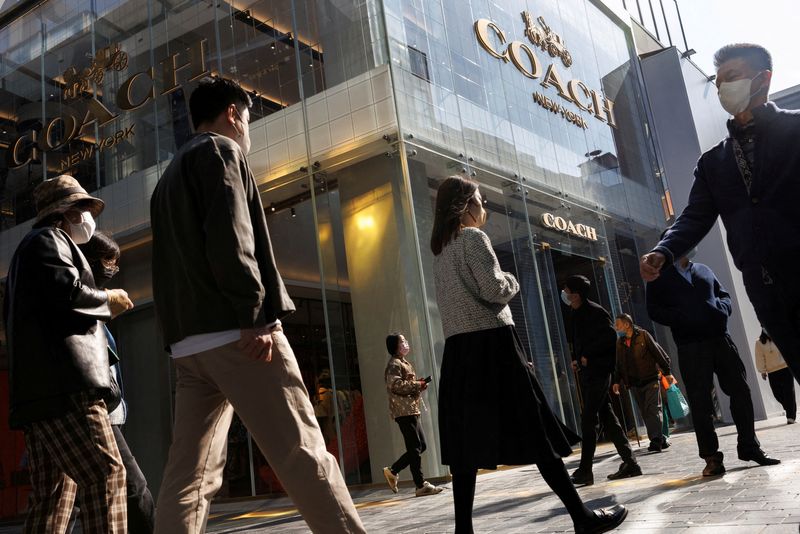By Kevin Yao
BEIJING (Reuters) - Chinese consumer spending has failed to respond to government measures even though household deposits are slowing and banks have slashed interest rates, a sign risk-averse residents prefer to repay debt and buy wealth management products.
Chinese households added 9.27 trillion yuan ($1.3 trillion) in new deposits in the first half - including 2.14 trillion in June, down 22% from a year earlier, according to data from the People's Bank of China.
Outstanding household yuan deposits rose 10.6% year-on-year in June, but remained near the lowest in at least three years.
While China's savers were putting less in the bank, data this week showed this had not translated into higher consumption.
China's retail sales rose a slower-than-expected 2% in June from a year earlier, the weakest growth in 18 months, as deflationary pressures forced businesses to slash prices on everything from cars to clothes.
The data suggests Beijing's efforts to ignite consumption, including trade-ins of consumer goods, to boost flagging economic growth have so far not been enough to encourage China's savers to splash out at the shops, analysts said.
"The year-on-year decrease in excess savings growth has not yet translated into increased consumption. This may be related to households deleveraging by repaying loans early and shifting deposits to wealth management products," Tommy Xie, head of Greater China research at OCBC Bank, said in a note.
Deposit rate cuts aimed at encouraging spending and borrowing are redirecting household and corporate savings into wealth management products which channel money into bonds.
China's consumer spending is faltering as households become more cautious due to the confluence of falling property prices, job insecurity and high debt, analysts said.
That helped drag growth of the world's second-largest economy to 4.7% in the second quarter - slower than expected - from the 5.3% expansion in the first three months, the weakest since the first quarter of 2023.
Slowing deposits growth is broadly in line with bank lending, with lending for June released last week showing demand faltering again, with some key gauges hitting record lows.
While China's deposit pile could still be a potential growth driver over the long term, analysts say Beijing should ramp up support for consumers given the risk of excess capacity amid foreign trade curbs.
Beijing has sought to spur consumption after a shuttering post-COVID recovery, but it has focused on channelling vast resources towards buttressing manufacturing prowess.
Household yuan deposits rose to a record 146.3 trillion yuan at the end of in June.
Total yuan deposits, which include household, corporate and government deposits, amounted to 295.7 trillion yuan in June, dwarfing the market capitalisation of the mainland stock market, which is 73 trillion yuan, and gross domestic product, at 126 trillion yuan.
"Instead of quick-fix stimulus, policymakers would need to address the root causes of consumers’ risk-averse behavior and encourage them to spend their incomes," analysts at Maybank said in a note.

"This calls for structural solutions to resolve fundamental issues such as the protracted property downturn, fragile employment market, patchy social safety nets, and elevated debt burdens."
($1 = 7.2572 Chinese yuan renminbi)